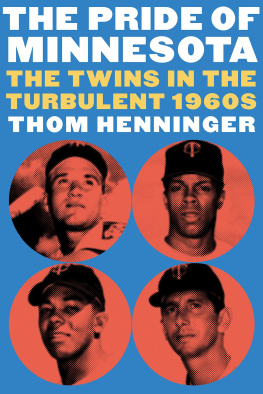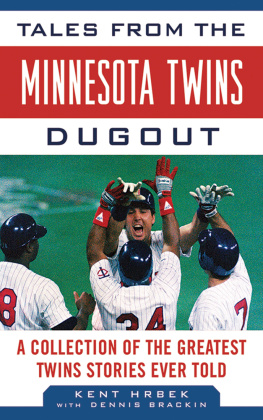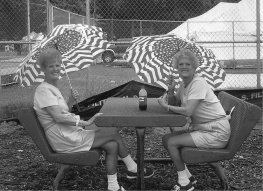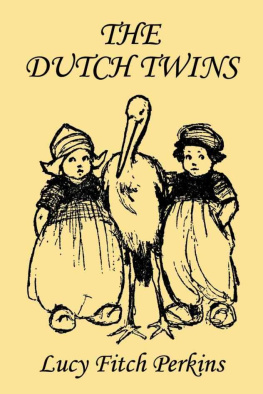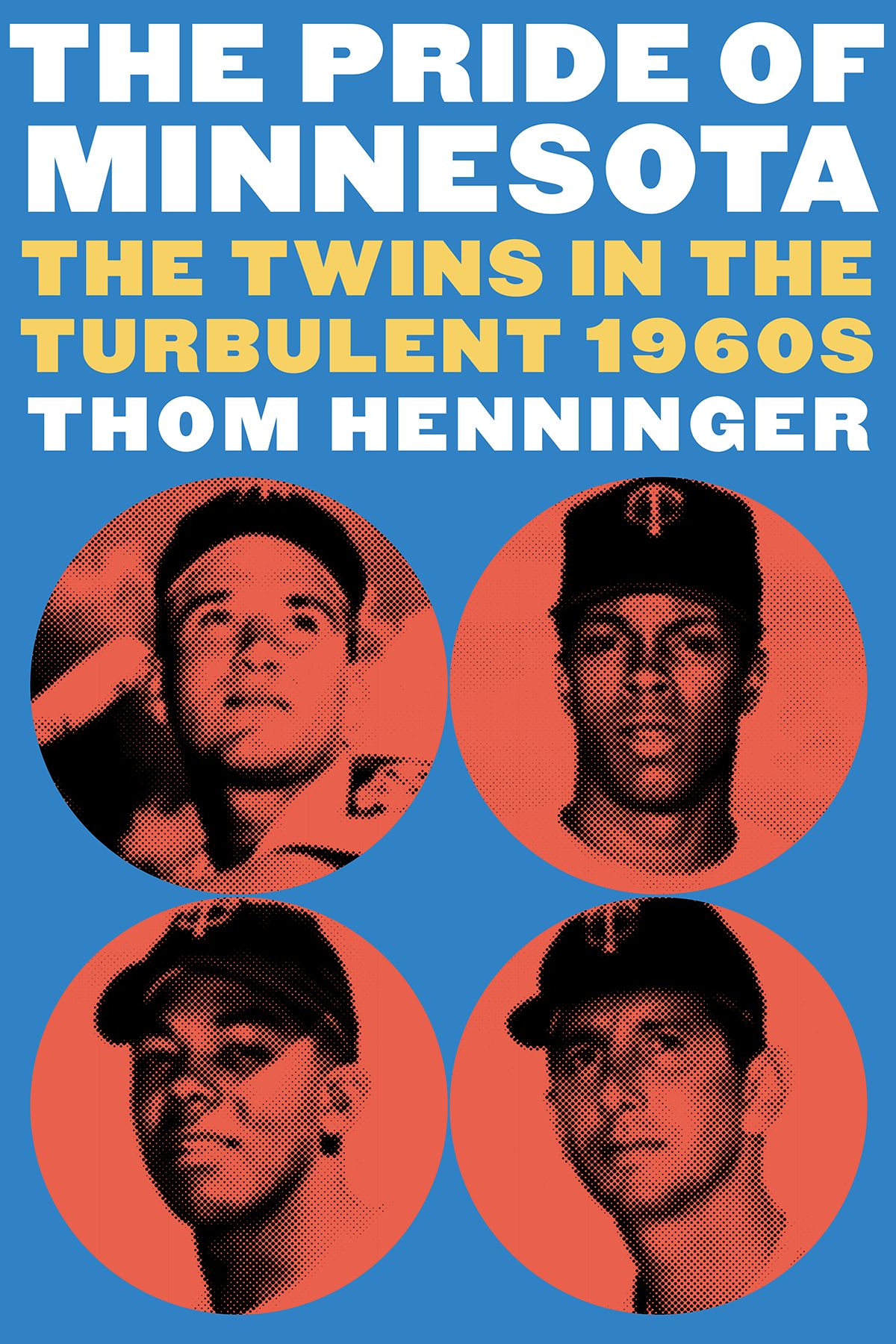
The Pride of Minnesota is a wonderful read, describing the early success of the Twins and the many important events that happened in the country during the era.
Jim Kaat, longtime Twins pitcher and current assistant to the Twins president
Thom Henninger covers the shifts and upheavals of a period that was a magical time for Minnesota baseball fans. The 1960s brought the excitement of Major League Baseball to the state and set off the most successful decade the Twins ever had.... A hit for baseball fans and beyond.
Stew Thornley, Minnesota baseball historian
The Pride of Minnesota
The Twins in the Turbulent 1960s
Thom Henninger
University of Nebraska Press | Lincoln
2021 by Thom Henninger
Cover designed by University of Nebraska Press; cover images: Rod Carew AP Images; Billy Martin The National Baseball Hall of Fame and Museum; others are in the public domain.
Unless otherwise noted, all photos are courtesy of the Minnesota Twins.
All rights reserved
Library of Congress Cataloging-in-Publication Data
Names: Henninger, Thom, author.
Title: The pride of Minnesota: the Twins in the turbulent 1960s / Thom Henninger.
Description: Lincoln: University of Nebraska Press, 2021. | Includes bibliographical references and index.
Identifiers: LCCN 2020041729
ISBN 9781496225603 (Hardback: acid-free paper)
ISBN 9781496227119 (ePub)
ISBN 9781496227133 ( PDF )
Subjects: LCSH : Minnesota Twins (Baseball team)History. | World Series (Baseball) (1965) | BaseballMinnesotaMinneapolisHistory. | Major League Baseball (Organization)History20th century.
Classification: LCC GV 875. M 55 . H 46 2021 | DDC 796.357/6409776579dc23
LC record available at https://lccn.loc.gov/2020041729
The publisher does not have any control over and does not assume any responsibility for author or third-party websites or their content.
Contents
Like so many boys growing up in St. Paul in the early 1960s, I spent most of my summer days at the local playground playing baseball. Two or three games a day were common, interrupted only by meals and rain. It was after a sunny afternoon at the playgroundin June 1964that I learned the Minnesota Twins had traded away two of my favorite players. I was ten years old, a loyal Twins fan since the team arrived from Washington DC four years earlier, and I was disheartened to hear my team had dealt fleet-footed center fielder Lenny Green and dazzling first baseman Vic Power to the Los Angeles Angels.
Green was on the field when the Twins played their first game at Yankee Stadium on April 11, 1961. He batted second between rookie Zoilo Versalles and young slugger Harmon Killebrew, but was the primary leadoff man for the first two years of Twins baseball. Green, who walked far more often than he struck out, ranked among league leaders in walks and runs in 61 and 62. He caught my attention for his speed and grace in the outfield, ranging far to chase down fly balls that seemed out of reach. Like Green, I was left-handed, and I wanted to play like him when I roamed the outfield at the playground. By late in the summer I would always be very tan, and I remember my mother once telling me I was looking more like Lenny Green every day. She told me years later that I beamed with pride when she spoke those words.
Power came to Minnesota shortly before Opening Day 1962, acquired in a trade that moved Pedro Ramosthe starter and winning pitcher of that first Twins gameto Cleveland. Power was a slick-fielding first baseman who scooped balls out of the dirt effortlessly with a sweeping motion while blowing huge bubbles with his gum. And he caught everything one-handed, breaking the cardinal rule that every coach preached to me growing up: catch the ball with two hands. That, of course, is something almost nobody does today. Power, who grew up in Puerto Rico, was outgoing, gregarious, a mentor to Latin players such as Versalles and Tony Oliva, and a fan favorite who loved playing in Minnesota.
Seeing Green and Power depart didnt sit well with ten-year-old me. By then, I took a liking to first base, worked at digging low throws out of the dirt, and chewed a lot of gum. Even after Green and Power were long gone and the Twins were contenders later in the decade, I wished they had been able to play for the 1965 club that won the American League pennant. Both spent twelve seasons in the Majors; neither made it to a World Series. The Yankees represented the AL in all but three years of Powers career, and Power retired after the 65 season. Green came close more than once. He played for the Red Sox in 65 and 66, but joined the Detroit Tigers the following season, when Boston enjoyed its Impossible Dream run to the AL title. Green played his last six Major League games in June 1968 for the Tigers, who won the World Series that October.
That 1964 trade was an early lesson that change is a constant in life. The Twins, of course, emerged to dethrone the Yankees in 1965, beginning an era of success at a time when change was in the air on so many fronts and my interests were diversifying. The Beatles suddenly grabbed my attention, sparking an interest in music that didnt always garner parental approval. The national news was a fixture at home, and the budding civil rights movement and expanding Vietnam War were front and center. For the first time in history, television brought into our homes such events as the assassination of a president, Alabama state police attacking a group of peaceful protesters in Selma, the weekly footage of body bags coming home from a faraway war, and the challenges and ultimate victory of a decade-long pursuit to put human beings on the moon.
As a young person, it was a challenging time to make sense of the world. It seemed to be coming apart at the seams in 1968, when civil rights leader Martin Luther King Jr. and presidential candidate Robert Kennedy were assassinated two months apart in the midst of a divisive and eventful presidential campaign. Amid all the turmoil, with a young teenagers idealism and naivete, I was now riveted by the changes going on around me. At the same time, the Minnesota Twins, a constant as I grew up in the 60s, became an exciting team to follow through several dramatic pennant races.
I offer a special thanks to two longtime and dear friends, Stuart Shea and the late Ron Thompson, both of whom reviewed the manuscript and provided helpful advice and editing. Stus encouragement and support throughout the projects ups and downs mean so much to me, and Ill be forever touched that Ron tackled the manuscript when, unbeknownst to me, his illness had taken a turn for the worse and he had little time left. Thanks also to good friends Ken Goldberg and Chuck Miller, who weighed in on subject matter or provided statistical support along the way.
Taking on a historical project like this one was made much easier by such sources as Baseball Reference and Retrosheet. And it couldnt have been done without the beat writers of the era bringing Twins baseball to life. Growing up, I read St. Paul Pioneer Press beat writer Arno Goethels coverage of the Twins religiously, and his insights and humor help tell this story. Id also like to acknowledge the valuable work of his 1960s colleagues on both sides of the river: Tom Briere, Mike Lamey, Glenn Redmann, Patrick Reusse, Dave Mona, Jon Roe, Dwayne Netland, and columnists Dick Young, Sid Hartman, and the outrageous Don Riley.
The expertise and attention to detail of Rob Taylor, Joeth Zucco, Amanda Jackson, and other University of Nebraska Press staff that steered this project to completion are also appreciated. And I offer my heartfelt thanks to my wife, Kathy McMahon, and our wonderful daughter, Meara McMahon. They were always supportive during this often-lonely endeavor. Its because of them youll find George Harrison wearing a Twins cap in these pages.
Next page
